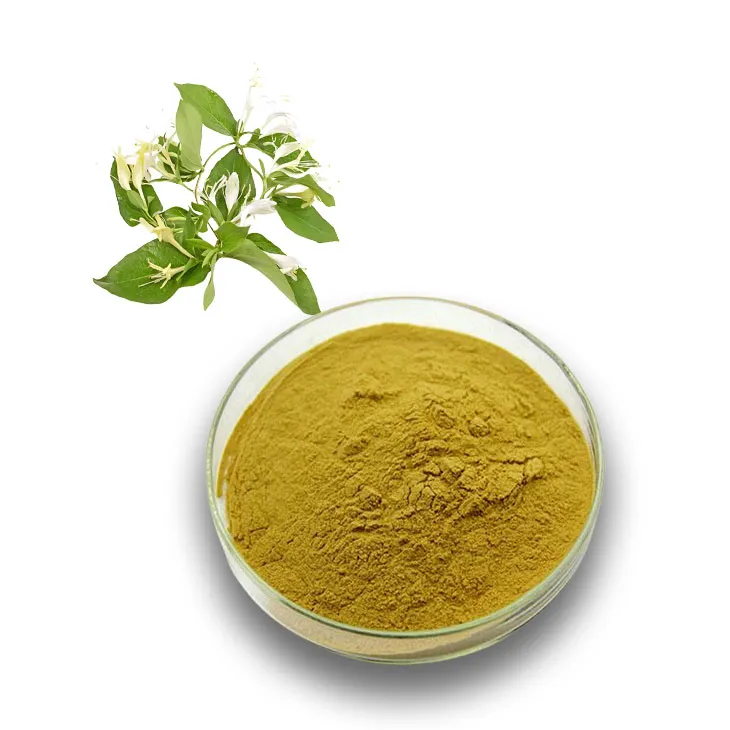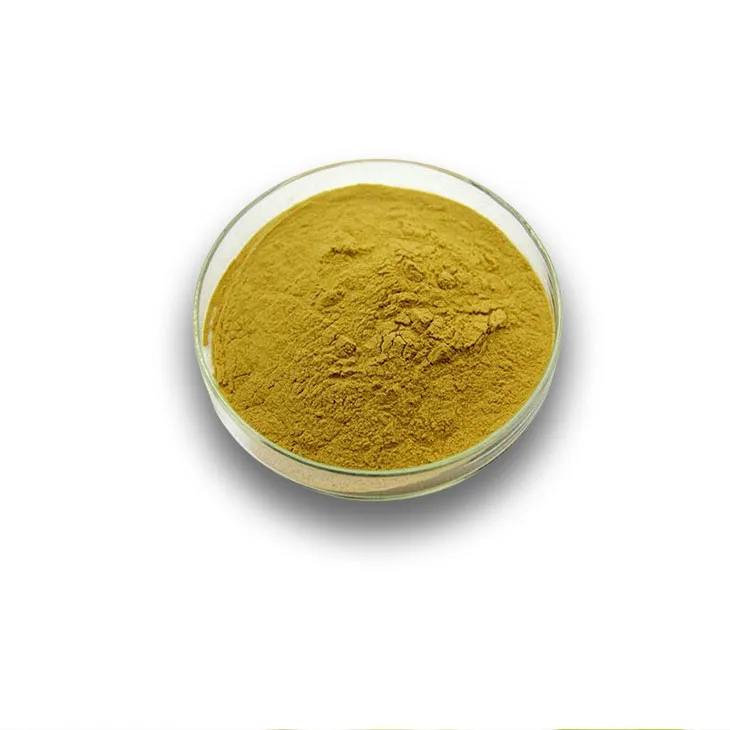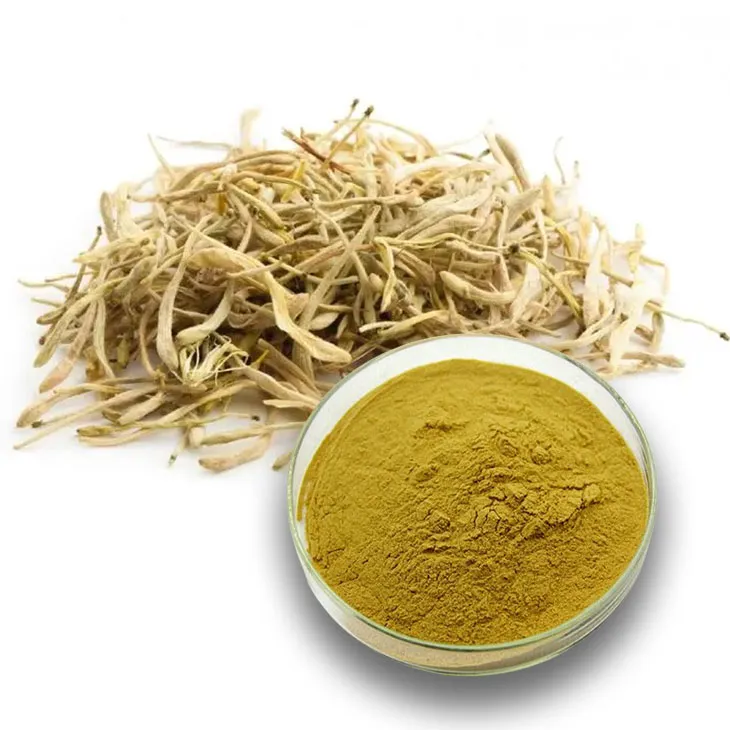- 0086-571-85302990
- sales@greenskybio.com
The Application of Honeysuckle Pollen in Skin Care.
2024-11-14

1. Introduction to Honeysuckle Pollen
Honeysuckle, a well - known plant, has been used in traditional medicine for centuries. Honeysuckle Pollen, in particular, is a valuable part of this plant. It is rich in various nutrients and bioactive compounds. These components make it a potentially excellent ingredient for skin care products.

2. Nutritional Components in Honeysuckle Pollen
2.1 Vitamins
Honeysuckle pollen contains a variety of vitamins. For example, it has vitamin C, which is a powerful antioxidant. Vitamin C can help to neutralize free radicals in the skin. Free radicals are often produced due to environmental factors such as pollution and UV radiation. By neutralizing them, vitamin C can prevent premature skin aging, such as the formation of wrinkles and fine lines.2.2 Minerals
Minerals like zinc and selenium are also present in honeysuckle pollen. Zinc is essential for skin health as it plays a role in the normal functioning of skin cells. It helps in the repair and regeneration of the skin. Selenium, on the other hand, has antioxidant properties that protect the skin from oxidative stress.2.3 Amino Acids
There are several amino acids in honeysuckle pollen. Amino acids are the building blocks of proteins. In the skin, proteins are crucial for maintaining its structure and elasticity. Some amino acids can also help in the hydration of the skin, making it look plump and healthy.
3. Skin - Soothing Properties
One of the significant benefits of honeysuckle pollen in skin care is its ability to soothe irritated skin.
3.1 Anti - inflammatory Effects
Honeysuckle pollen has anti - inflammatory properties. Inflammation in the skin can be caused by various factors, such as allergens, harsh chemicals, or skin diseases. When applied to the skin, the components in honeysuckle pollen can reduce the redness, swelling, and itching associated with skin inflammation. For example, it can be beneficial for people with eczema or rosacea, who often experience chronic skin inflammation.3.2 Calming Sensation
The natural compounds in honeysuckle pollen create a calming sensation on the skin. This is not only physically soothing but also can have a psychological impact on the user. When the skin feels calm, it is less likely to react to external stimuli, and the overall appearance of the skin can improve.
4. Enhancing Skin Barrier Function
4.1 Role of Micronutrients
The micronutrients in honeysuckle pollen play a crucial role in enhancing the skin's natural barrier function. The skin barrier is like a protective shield that prevents the entry of harmful substances and the loss of moisture. The vitamins, minerals, and other bioactive compounds in the pollen work together to strengthen this barrier. For instance, certain lipids present in the pollen can fill in the gaps between skin cells, making the barrier more intact.4.2 Moisture Retention
A healthy skin barrier is essential for moisture retention. Honeysuckle pollen helps the skin to retain moisture better. When the skin is well - hydrated, it looks smoother, softer, and more radiant. It can also prevent the development of dry and flaky skin, which is a common problem, especially in dry climates or during the winter months.4.3 Protection from External Factors
By strengthening the skin barrier, honeysuckle pollen protects the skin from external harmful factors. These factors include pollutants, bacteria, and viruses. A strong skin barrier can prevent these substances from penetrating the skin and causing damage or infections.
5. Anti - Aging Effects
5.1 Collagen Production
Honeysuckle pollen can stimulate collagen production in the skin. Collagen is a protein that gives the skin its strength and elasticity. As we age, the production of collagen decreases, leading to sagging skin and wrinkles. By promoting collagen production, honeysuckle pollen can help to maintain the firmness and elasticity of the skin, reducing the signs of aging.5.2 Antioxidant Activity
The antioxidant activity of honeysuckle pollen is also beneficial for anti - aging. As mentioned earlier, it contains antioxidants like vitamin C and selenium. These antioxidants can neutralize free radicals, which are known to damage skin cells and accelerate the aging process. By reducing the damage caused by free radicals, honeysuckle pollen can keep the skin looking youthful for a longer time.6. Incorporating Honeysuckle Pollen in Skin Care Products
6.1 Face Creams and Lotions
Honeysuckle pollen can be incorporated into face creams and lotions. These products are used daily by many people for skin hydration and protection. When added to face creams, the pollen can provide its skin - soothing, barrier - enhancing, and anti - aging benefits. It can be blended with other natural ingredients like aloe vera and jojoba oil to create a more effective and luxurious skin care product.6.2 Masks
Face masks are another popular skin care product where honeysuckle pollen can be used. A mask with honeysuckle pollen can be applied to the face for a specific period, usually 15 - 20 minutes. During this time, the skin can absorb the beneficial components of the pollen more intensively. Masks with honeysuckle pollen can be especially beneficial for treating specific skin problems, such as dull skin or acne - prone skin.6.3 Serums
Skin serums are concentrated products that target specific skin concerns. Honeysuckle pollen - based serums can be developed to focus on issues like skin firmness or hyperpigmentation. The lightweight texture of serums allows for better penetration of the active ingredients into the skin, making it an ideal vehicle for delivering the benefits of honeysuckle pollen.7. Safety and Precautions
While honeysuckle pollen has many potential benefits for skin care, it is important to consider safety and precautions.
- Allergic Reactions: Some people may be allergic to honeysuckle pollen. Before using any skin care product containing honeysuckle pollen, it is advisable to do a patch test on a small area of the skin. If there is any redness, itching, or swelling within 24 - 48 hours, it indicates an allergic reaction, and the product should not be used.
- Quality Control: When using honeysuckle pollen in skin care products, it is crucial to ensure the quality of the pollen. Poor - quality pollen may contain contaminants or impurities that could be harmful to the skin. It is recommended to use products from reliable brands that follow strict quality control standards.
- Pregnancy and Nursing: Pregnant or nursing women should consult a healthcare provider before using skin care products with honeysuckle pollen. Although there is no conclusive evidence of harm, it is better to be cautious during this special period.
8. Conclusion
Honeysuckle pollen has great potential in skin care applications. Its natural properties, including skin - soothing, barrier - enhancing, and anti - aging effects, make it an attractive ingredient for skin care products. With the growing trend towards natural skin care, honeysuckle pollen is likely to gain more attention and be used more widely in the future. However, safety precautions should always be taken to ensure its proper use and avoid any potential adverse effects.
FAQ:
What are the main benefits of honeysuckle pollen in skin care?
Honeysuckle pollen has several benefits in skin care. It can soothe irritated skin due to its calming effect. Also, the micronutrients in it enhance the skin's natural barrier function, which helps the skin retain moisture better and protects it from external harmful factors.
How does honeysuckle pollen soothe irritated skin?
The exact mechanism of how it soothes irritated skin isn't fully understood, but it is thought to be related to its natural components that have a calming effect on the skin. These components may interact with the skin cells in a way that reduces inflammation and irritation.
Can honeysuckle pollen be used for all skin types?
There is no evidence currently suggesting that honeysuckle pollen is not suitable for certain skin types. However, as with any new skincare ingredient, it is advisable to do a patch test first. If no allergic reactions occur, it may potentially be beneficial for all skin types as it mainly focuses on soothing and enhancing the skin barrier which are common needs for different skin types.
How can honeysuckle pollen be incorporated into a skin care routine?
Honeysuckle pollen can be incorporated into skincare products such as creams, lotions, or masks. Some products may already contain honeysuckle pollen extract. You can also look for natural or organic products that specifically highlight the use of honeysuckle pollen. It is usually applied to the skin after cleansing and toning, similar to other skincare products.
Is honeysuckle pollen - based skin care products safe?
Generally, if the product is properly formulated and sourced, honeysuckle pollen - based skin care products are considered safe. However, some people may be allergic to pollen in general, so it is important to check the ingredient list carefully and do a patch test before using a new product. Also, products should be from reliable manufacturers who follow safety and quality standards.
Related literature
- The Role of Natural Ingredients in Skin Care"
- "Beneficial Plant - based Ingredients for Skin Health"
- "Honeysuckle: Beyond the Garden - Its Applications in Cosmetics"
- ▶ Hesperidin
- ▶ citrus bioflavonoids
- ▶ plant extract
- ▶ lycopene
- ▶ Diosmin
- ▶ Grape seed extract
- ▶ Sea buckthorn Juice Powder
- ▶ Beetroot powder
- ▶ Hops Extract
- ▶ Artichoke Extract
- ▶ Reishi mushroom extract
- ▶ Astaxanthin
- ▶ Green Tea Extract
- ▶ Curcumin Extract
- ▶ Horse Chestnut Extract
- ▶ Other Problems
- ▶ Boswellia Serrata Extract
- ▶ Resveratrol Extract
- ▶ Marigold Extract
- ▶ Grape Leaf Extract
- ▶ blog3
- ▶ blog4
- ▶ blog5
-
Organic Tongkat Ali extract powder factory.
2024-11-14
-
How to make powder with ashwagandha extract.
2024-11-14
-
Rosehip extract manufacturers from China.
2024-11-14
-
The best cat's claw extract in nature.
2024-11-14
-
Chinese Dandelion Leaf Extract Suppliers.
2024-11-14
-
Ginger Extract
2024-11-14
-
Diosmin
2024-11-14
-
Mangosteen extract powder
2024-11-14
-
White Peony Extract
2024-11-14
-
Curcumin Extract
2024-11-14
-
Mulberry leaf Extract
2024-11-14
-
Angelica sinensis extract
2024-11-14
-
Withania Somnifera Extract
2024-11-14
-
Konjac Powder
2024-11-14
-
Artichoke Extract
2024-11-14





















